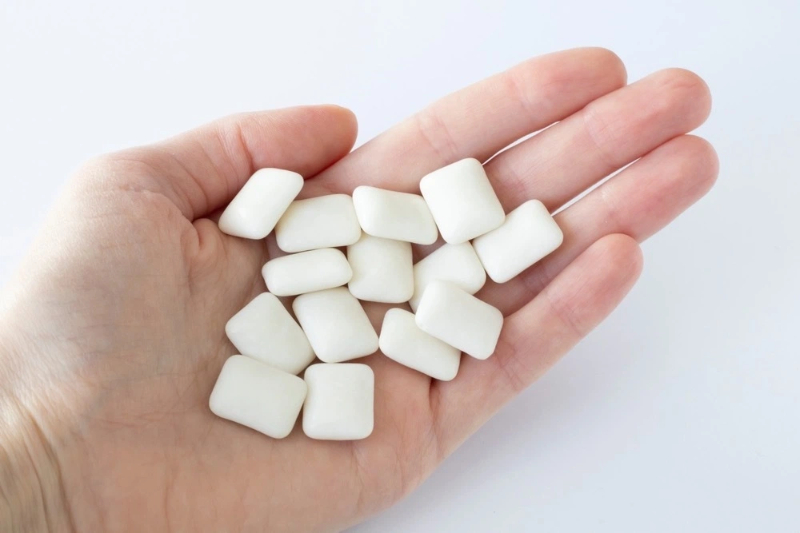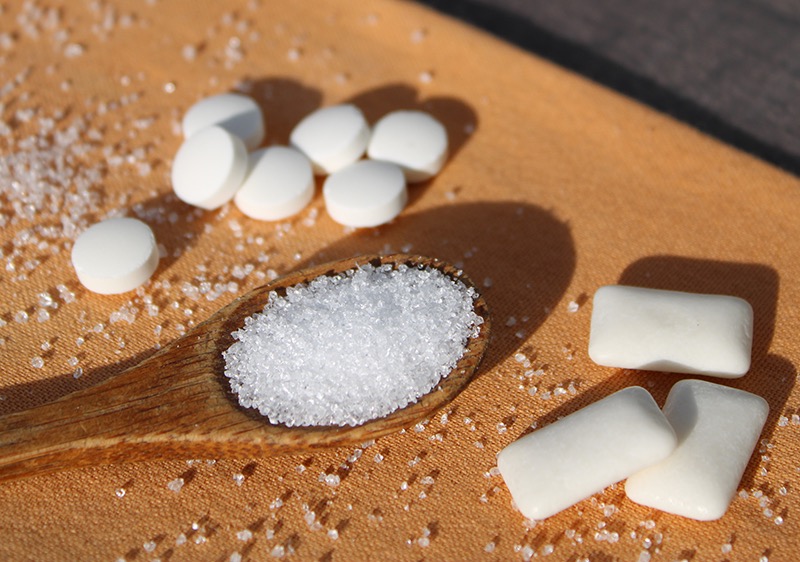Views: 222 Author: Sara Publish Time: 2025-07-14 Origin: Site








Content Menu
>> Key Characteristics of Xylitol:
>> Key Characteristics of Stevia:
● Xylitol vs Stevia: A Detailed Comparison
>> Xylitol:
>> Stevia:
● Environmental and Production Considerations
● Considerations for Specific Populations
>> For Pets:
● Combining Xylitol and Stevia
● FAQ
>> 1. Is xylitol safe for everyone?
>> 2. Can stevia be used for baking like xylitol?
>> 3. Do xylitol and stevia affect blood sugar?
>> 4. Which sweetener is better for dental health?
>> 5. Can xylitol and stevia be combined?
In the quest for healthier sweetening options, xylitol and stevia have emerged as two popular natural alternatives to sugar. Both are favored for their low-calorie profiles and dental benefits, but they differ significantly in origin, taste, chemical structure, and applications. This article explores the differences and similarities between xylitol and stevia, helping you understand which sweetener might best suit your needs.

Xylitol is a sugar alcohol naturally found in various fruits and vegetables, including berries, oats, and mushrooms. Traditionally derived from birch trees, xylitol has a crystalline appearance and tastes very similar to sugar, though it is about 5% less sweet.
- Chemical nature: Sugar alcohol (polyol)
- Sweetness: Approximately 95% as sweet as sugar
- Calories: About 2.4 calories per gram (less than sugar's 4 calories)
- Taste: Clean, sweet taste with no bitter or licorice aftertaste
- Dental benefits: Helps reduce bacteria that cause tooth decay and promotes oral health
- Uses: Widely used in sugar-free chewing gums, toothpaste, baked goods, and candies
Xylitol's molecular structure resembles sugar but differs enough to provide fewer calories and a lower glycemic index. This makes it particularly attractive for people managing diabetes or those seeking to reduce sugar intake. Additionally, xylitol is absorbed more slowly in the digestive system, which helps prevent blood sugar spikes.
Stevia is a natural sweetener extracted from the leaves of the Stevia rebaudiana plant, native to South America. It is intensely sweet—between 100 to 300 times sweeter than sugar—and contains zero calories.
- Chemical nature: Natural glycosides (steviol glycosides like stevioside and rebaudioside)
- Sweetness: 100 to 300 times sweeter than sugar
- Calories: Zero calories
- Taste: Has a distinctive licorice-like aftertaste, which some people find unpleasant
- Dental benefits: Does not promote tooth decay
- Uses: Commonly found in packets, beverages, and as a tabletop sweetener; also used in some soft drinks like Coca-Cola's Truvia and Pepsi's PureVia
Stevia's sweetness comes from steviol glycosides, which interact with taste receptors differently than sugar or sugar alcohols. While stevia is calorie-free and does not raise blood sugar levels, its intense sweetness and unique aftertaste can be polarizing. Some manufacturers blend stevia with other sweeteners or bulking agents to improve flavor and usability.
| Feature | Xylitol | Stevia |
|---|---|---|
| Source | Sugar alcohol from birch trees, plants | Extracted from Stevia rebaudiana leaves |
| Sweetness | ~95% as sweet as sugar | 100-300 times sweeter than sugar |
| Calories | ~2.4 cal/g | 0 calories |
| Taste | Similar to sugar, no aftertaste | Licorice aftertaste, can be bitter |
| Dental Health | Prevents tooth decay, reduces bacteria | Does not cause tooth decay |
| Glycemic Index | Low (about 7) | Zero |
| Uses | Gum, toothpaste, baked goods, candies | Beverages, packets, tabletop sweetener |
| Safety | Approved by FDA and WHO as safe | FDA GRAS status for purified extracts; crude leaves not approved |
| Health Benefits | May reduce ear infections, improve dental health | May help regulate blood sugar, no calories |
- Dental health: Xylitol inhibits the growth of *Streptococcus mutans*, the bacteria responsible for cavities. Regular use of xylitol-containing products has been shown to reduce tooth decay and improve oral hygiene.
- Low glycemic impact: Suitable for diabetics due to minimal effect on blood sugar. Its low glycemic index means it does not cause rapid spikes in blood glucose levels.
- Other benefits: Studies suggest xylitol may reduce ear infections by inhibiting bacterial growth in the ear canal. There is also emerging evidence of its positive effects on bone health and gut microbiota.
- Safety: Recognized as safe by FDA since 1963 and supported by WHO/FAO committees. However, excessive consumption may cause digestive discomfort such as bloating or diarrhea due to its sugar alcohol nature.
- Calorie-free: Suitable for weight management and calorie-conscious consumers.
- Blood sugar control: May help regulate glucose levels, beneficial for diabetics. Some research suggests stevia can improve insulin sensitivity.
- Safety: FDA classifies purified stevia extracts as Generally Recognized as Safe (GRAS), though whole stevia leaves and crude extracts are not approved due to insufficient safety data.
- Additional health effects: Some studies indicate stevia may have antioxidant and anti-inflammatory properties, though more research is needed.

- Closely mimics sugar's taste and texture, making it a versatile sweetener.
- Can be used in baking, cooking, and beverages without altering flavor significantly.
- Does not have a bitter or licorice aftertaste, which helps maintain the natural flavor profile of foods.
- Provides bulk similar to sugar, making it easier to substitute in recipes that require volume and texture, such as cakes and cookies.
- Because xylitol has a cooling effect on the tongue, it is often preferred in chewing gums and mints.
- Much sweeter than sugar, so only small amounts are needed, which can make precise measurement challenging.
- Has a noticeable licorice or bitter aftertaste, which some consumers dislike, especially when used in large quantities.
- Lacks sugar's bulk, which can affect texture in baking and cooking; often requires blending with bulking agents like erythritol or maltodextrin.
- Commonly used in beverages, tabletop sweeteners, and low-calorie processed foods.
- The aftertaste can be masked by blending with other sweeteners or flavor enhancers.
Xylitol is primarily produced by hydrogenating xylose, a sugar derived from plant fibers such as birch wood or corn cobs. The process is energy-intensive but benefits from utilizing renewable plant materials. As a byproduct of wood processing, xylitol production supports sustainable forestry practices when managed responsibly.
Stevia cultivation is relatively low-impact, requiring less water and pesticides compared to sugarcane or corn. The extraction of steviol glycosides involves water or alcohol-based extraction methods, followed by purification. The scalability of stevia farming is increasing globally, with major production centers in South America and Asia.
Both xylitol and stevia are excellent sugar alternatives for people with diabetes. Xylitol has a low glycemic index and provides some calories, whereas stevia is calorie-free and does not affect blood sugar. However, individuals should monitor their own responses, as tolerance and effects may vary.
Xylitol is often included in dental products for children due to its cavity-preventing properties. However, care should be taken to avoid excessive consumption to prevent digestive upset. Stevia is generally considered safe but is less commonly used in children's products.
It is critical to note that xylitol is highly toxic to dogs and other pets, causing rapid insulin release and potentially fatal hypoglycemia. Stevia is not known to be toxic to pets but should still be kept out of their reach.
Many manufacturers blend xylitol and stevia to create sweetener products that balance sweetness, reduce aftertaste, and improve texture. Such blends leverage xylitol's sugar-like bulk and mouthfeel with stevia's intense sweetness, allowing for lower overall calorie content and better flavor profiles. These combinations are popular in sugar-free gums, beverages, and tabletop sweeteners.
While xylitol and stevia are both natural, low-calorie sugar alternatives, they are not the same. Xylitol is a sugar alcohol with a taste and texture very similar to sugar and notable dental benefits. Stevia is a plant extract that is far sweeter than sugar but has a distinct licorice aftertaste and zero calories. Your choice between xylitol and stevia depends largely on taste preference, intended use, and dietary needs. Both sweeteners offer healthier alternatives to sugar when used in moderation, and their unique properties make them suitable for different applications in food, beverage, and healthcare products.

Xylitol is generally safe for humans and approved by regulatory bodies like the FDA. However, it is highly toxic to dogs and should be kept away from pets.
Stevia lacks the bulk of sugar and has a strong aftertaste, which can affect baked goods. Xylitol is better suited for baking due to its sugar-like properties.
Both have minimal impact on blood sugar, making them suitable for diabetics. Xylitol has a low glycemic index, while stevia contains no calories or carbs.
Xylitol has proven dental benefits by reducing cavity-causing bacteria. Stevia does not cause tooth decay but lacks the antibacterial properties of xylitol.
Yes, some natural sweetener blends combine xylitol and stevia to balance sweetness, reduce aftertaste, and improve texture.
